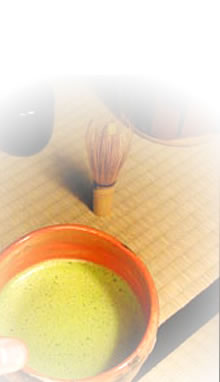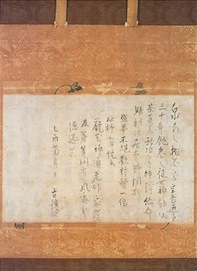|
Practicing Tea with a Sincere Mind To elaborate upon the phrase in the Nampōroku, "Ichi za ichi e" (一座一会 one group, one moment), we can look at Ii Naosuke's phrase "Ichi go ichi e" (一期一 会 each meeting, only once), as it appears in his Chanoyu ichi e shū. In this work, Ii discusses the attitude with which one ought to do Tea:
The scroll that Rikyū chose to hang at the gathering was a treasure unparalleled in value, a calligraphy by Kidō Chigu. Known as the Ikushima Kidō after a former owner, the scroll had been entrusted to Rikyū by Hideyoshi for restoration. It was ironic that Rikyū chose to hold the gathering at Jurakudai, considering that it was Hideyoshi who had ordered Kokei's exile. Karaki Junzō suggests in the book Sen Rikyū that this indicates Rikyū's objection to Hideyoshi's action. Thus we can only speculate as to what was in Rikyū's mind when he selected to use a scroll that Hideyoshi so highly prized, and to do so in Jurakudai where Hideyoshi was living. Since Rikyū was from long experience fully aware of Hideyoshi's character, it is not impossible for us to surmise that in taking such action, he was prepared for death. Why would Rikyū risk his life to hang that particular scroll? Horiguchi Sutemi in The Tea of Rikyū comments that this was an acutely intense gathering, and indeed this must have been the case. Rikyū must have believed that the Ikushima Kidō scroll and no other was appropriate to the occasion. Wabi Tea is meant to epitomize just this attitude: when one puts the kettle on for a gathering, it is a once-in-a-lifetime opportunity to be taken very seriously. Thus "Ichi go ichi e" is often like a fencing match with both participants using naked swords. The mind is clear of all extraneous throughts. The mind with no extraneous thoughts is said to be in a state of Mu, or nothingness. In Tea, we have the expression "jita ichinyo" (自他一如 self and other are like one) and "shukyaku ittai" (主客一体 host and guest are a single phenomenon). It can be thought that cultivation the mind of "Ichi za konryū" (一座建立 those who sit together coalesce) that was coined by the Noh master Seami also describes the state where the minds of the host and the guest have become one. Only those who have actually invited guests to a tea gathering can know to what lengths the host must go to create an atmosphere that can be described as "ichi za konryū." The more time passes, the more difficult it is to comprehend the depth of mindfulness this requires, so much so that it may be beyond our imagination in this day and age. It can be said that Tea is "the art of utensil selection," and it is important to realize that for the host, this concern for utensils requires extreme mindfulness. From the past to the present, for those who truly enjoy Tea, the expression "Teishu shichibu ni kyaku sanbu" (亭主七分に客三分), is still relevant. The literal meaning of this phrase is, to the host seven parts and to the guest three, in regard to their respective responsibilities and pleasures. If we in the present generation always thought in terms of "ichi go ichi e," we would quickly become neurotic. However, terms which originated in the practice of Tea should not be seen as entirely irrelevant to today's world. Recently "ichi go ichi e" has been used in television commercials and is increasingly cited as a favorite proverb. This is a positive development. It is my hope that the phrase "ichi go ichi e," now no longer limited to the Tea world, will not be understood in its superficial sense, but rather deeply experienced by as many people as possible. Originally published in the Urasenke Foundation San
Francisco's newsletter Wakamatsu No. 31 Winter 1993.
|
|

 In the sixteenth year of Tenshō (1588), on the
fourth day of the ninth month, the one hundred and seventh abbot
of Daitokuji, Kokei Sōchin 古溪宗陳,
incurred the wrath of Hideyoshi and was banished to Kyūshū.
A farewell gathering for him was hosted by Sen Rikyū at his
compound within the precincts of Hideyoshi's Jurakudai palace. The
other participants at this gathering included Shun'oku Sōen
春屋宗園, Gyokuhō Jōsō 玉甫紹琮
and Hongakubō Senkō 本覚坊暹好
from Miidera. Abbot Kokei and Rikyū had been friends for a
long time. Kokei's Manuscript of Hoan [Hoankō 蒲庵稾—Kokei
also went by the name Hoan] indicates this when he states, "Sennan
Hōsensai Sōeki [Rikyū] has pursued Zen for over thirty
years as my disciple." The two men had practiced Zen together
for many years. Their relationship was such that they were able
to open their hearts to each other. Both were masters in their own
field, Rikyū in Tea and Kokei in Zen.
In the sixteenth year of Tenshō (1588), on the
fourth day of the ninth month, the one hundred and seventh abbot
of Daitokuji, Kokei Sōchin 古溪宗陳,
incurred the wrath of Hideyoshi and was banished to Kyūshū.
A farewell gathering for him was hosted by Sen Rikyū at his
compound within the precincts of Hideyoshi's Jurakudai palace. The
other participants at this gathering included Shun'oku Sōen
春屋宗園, Gyokuhō Jōsō 玉甫紹琮
and Hongakubō Senkō 本覚坊暹好
from Miidera. Abbot Kokei and Rikyū had been friends for a
long time. Kokei's Manuscript of Hoan [Hoankō 蒲庵稾—Kokei
also went by the name Hoan] indicates this when he states, "Sennan
Hōsensai Sōeki [Rikyū] has pursued Zen for over thirty
years as my disciple." The two men had practiced Zen together
for many years. Their relationship was such that they were able
to open their hearts to each other. Both were masters in their own
field, Rikyū in Tea and Kokei in Zen.